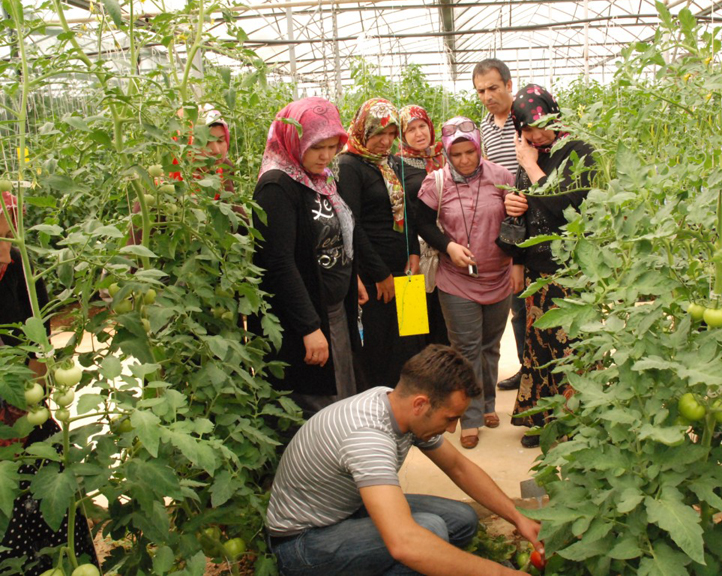

Empowering women farmers in Antalya

For 20 years, Habibe Akıncı has been raising tomatoes, eggplants and peppers on her family’s farm in Antalya province on the Mediterranean coast of Turkey. Though experienced farmers, Akıncı and her husband didn’t know that the chemicals and pesticides they were using were harmful to humans, animals and the environment – not to mention to their bottom line.
"Previously, we were looking to our neighbors’ fields and asking which pesticides or fertilizers they use. [But] in terms of agricultural business management, using chemicals was also increasing our production costs,” she explains.
But this has all changed. Akıncı recently joined 139 other women farmers and 30 female agriculture experts for trainings backed by the MDG-Fund on plant protection, use of pesticides and agricultural business management. The project is part of a broader effort, by the MDG-Fund working with the Turkish government, to bring more women into the country’s labor force and to boost incomes.
“With these trainings, I have learnt which pesticide to use against which threats and how much we should use,” says Akıncı. “Most importantly, we learnt that there should be a time gap between the last pesticide usage and the harvest, to produce pesticide residue-free vegetables. We are trying to decrease the amount of chemicals we use…instead, we started using cultural measures, biological and physical methods, and we are trying stronger seed types. By focusing on solarization, we were able to prevent different type of pests without using any chemicals.”
Akıncı says the skills she has learned have earned her the trust of consumers. As her products will be free of pesticide residue, she will be able to sell them more easily to a different profile of customers.
The trainings, carried out with the Antalya Provincial Food, Agriculture and Livestock Directorate, are part of a joint UN programme to reduce poverty in Turkey by improving work opportunities for women and young people.
Youth unemployment in Turkey is nearly 20%, twice the national average. Among youth, half as many women as men are employed. The joint programme, a collaboration between the Turkish national employment agency and four UN agencies (ILO, IOM, FAO and UNDP), also focuses on vulnerable migrant populations, which are largely concentrated in the Antalya region, a top tourism destination.
To date, more than 440 youth and women have benefitted from vocational and other training through the “Growth with Decent Work for All: National Youth Employment Program and Pilot Implementation in Antalya”. The programme also helped to develop the National Youth Employment Action Plan, launched at the end of 2011, and is assisting local institutions in designing and implementing employment interventions for unemployed and migrant young men and women.
These efforts are part of the MDG-F’s mission to help governments around the world to reach the poverty-reduction Millennium Development Goals, including achieving full and productive employment for all, gender equality and women’s empowerment. The work of the MDG-Fund is particularly focused on reaching the most disadvantaged and marginalized populations.
The trainings Akıncı participated in included courses on Good Agricultural Practices, Efficient and Healthy Use of Pesticides, and Integrated Disease and Pest Combat Methods. Not only are they going to boost her income, they have turned Akıncı into an advocate for producing and selling high quality, healthy vegetables grown in a natural and environmentally-friendly way.
“We should not forget that agriculture is not only important for us but also for all humanity and future generations,” says Akıncı, 39 and a mother of two. “This world has been given to us with its land, water and air; it is our duty to deliver a better and healthier world for future generations. We should protect both our agriculture fields and the environment as a whole.”
Akıncı says that, as a woman farmer, she considers herself responsible to contributing to her country’s food security and believes that she and her fellow-trainees should pass on the things they learned in these trainings to their family members, relatives, friends and neighbors. “If you train a man you train an individual, but if you train a woman you train a family as a whole.”
Click here to read more about MDG-F work in Turkey.
Click here to read other success stories from the MDG-F's work to fight poverty and improve livelihoods around the world.